Dutch court sentences Shell Nigeria to compensate local farmers 15 years after oil spills
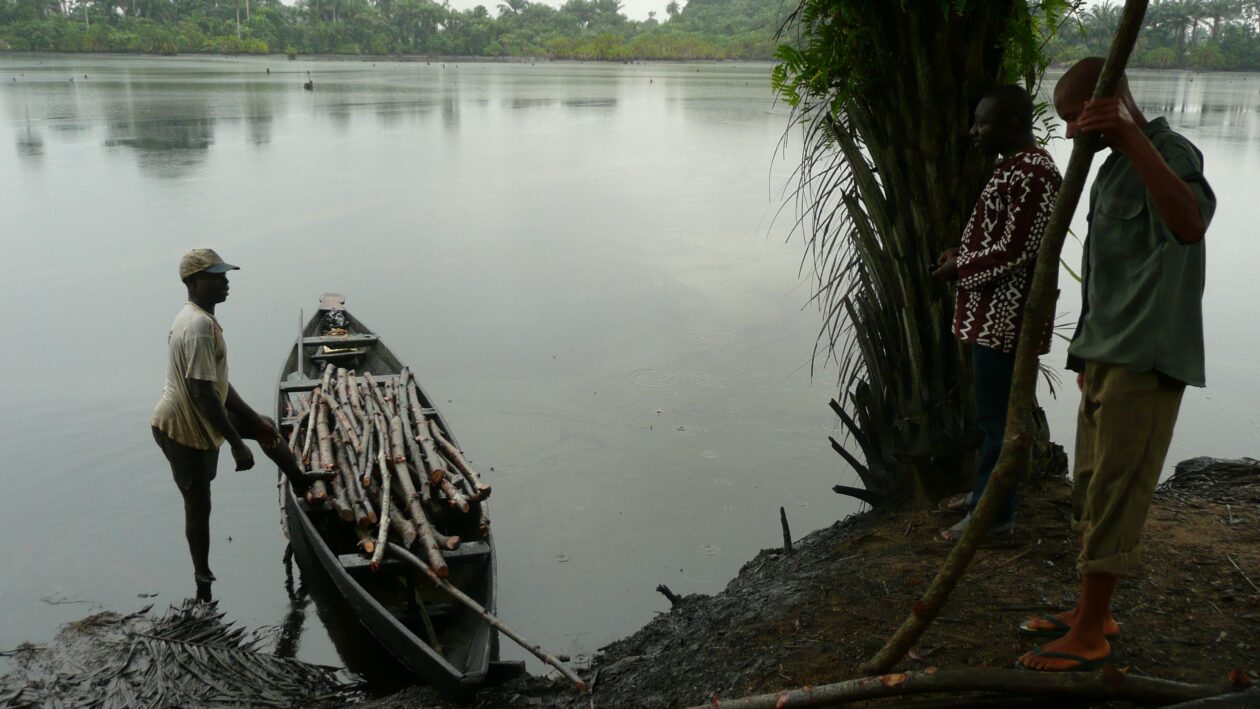
For over 50 years, Shell Oil has recklessly spilled millions of liters of oil in the Niger Delta. Oil has spilled into the waterways, contaminating vital rivers, destroying fertile farmland, and affecting the health and livelihoods of local farmers and fisherfolk.
Local communities have not stood by idly. Instead, they have taken action to stand up to Shell, force the company out of Ogoniland, and demand clean-up of the contamination.
Global Greengrants Fund, in partnership with many other organizations and activists in the region, has helped provide the resources necessary to build a movement in the Niger Delta to build back after the spills, spread awareness and hold Shell and other polluters accountable for their actions, and demand justice.
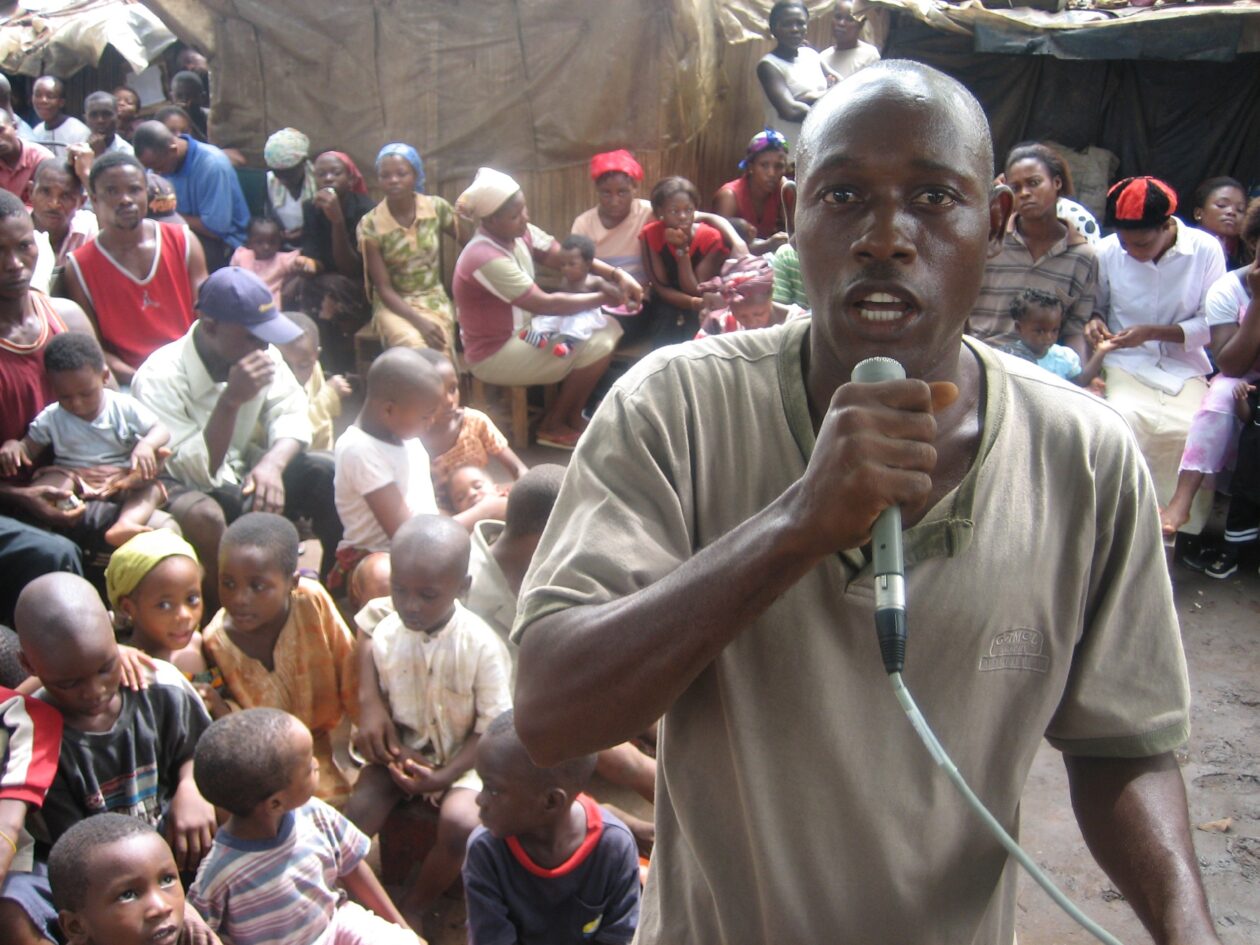
The Hague Calls Out Shell – Over and Over Again
Court cases move slowly with victories few and far between, yet every few years justice is served, and the courts rule against Shell to uphold the rights of those who call the Niger Delta home.
On January 26, 2021, a Dutch Court ruled that a subsidiary of Shell is responsible for spills that occurred in 2006 and 2007, demanding that the company compensate farmers in the region and clean up waterways within weeks. The case was brought against Shell by four Nigerian farmers and Friends of the Earth Netherlands in 2008.
This victory follows two other notable rulings: one in 2013, in which a Dutch Court held Shell accountable for a series of spills in the Ikat Ada Udo community in 2007. The other ruling in 2015 forced Shell to settle out of court to pay £55 million for two oil spills that devastated the health of communities and ecosystems in the Niger Delta community of Bodo.
Such victories are steps in the pursuit of justice and complement the work of local communities who have worked to propose solutions to protect and clean up the Niger Delta for over 60 years.
About the most recent ruling, Nnimmo Bassey, Co-Chair of our Board of Directors, advisor in Nigeria, Chair of Health of Mother Earth Foundation, and Nigerian environmental justice activist, said:
“This judgement didn’t come as a surprise to us. The evidence is overwhelming and has refused to disappear even until now. There are some crimes that are hard to hide. Environmental crimes are of that sort. It takes willful blindness to pretend not to see, smell, or feel. We are happy that Shell has been told the truth that they must pay for the extreme harm they have inflicted on the people and the environment. It took a long time, two plaintiffs died, but their struggle has not been in vain. No corporation – private or public – should ever think they can commit Ecocide in the Niger Delta and not be held accountable. The journey may be long, but judgment day always comes. This is just one decision by the Dutch Court, and others will definitely follow.”
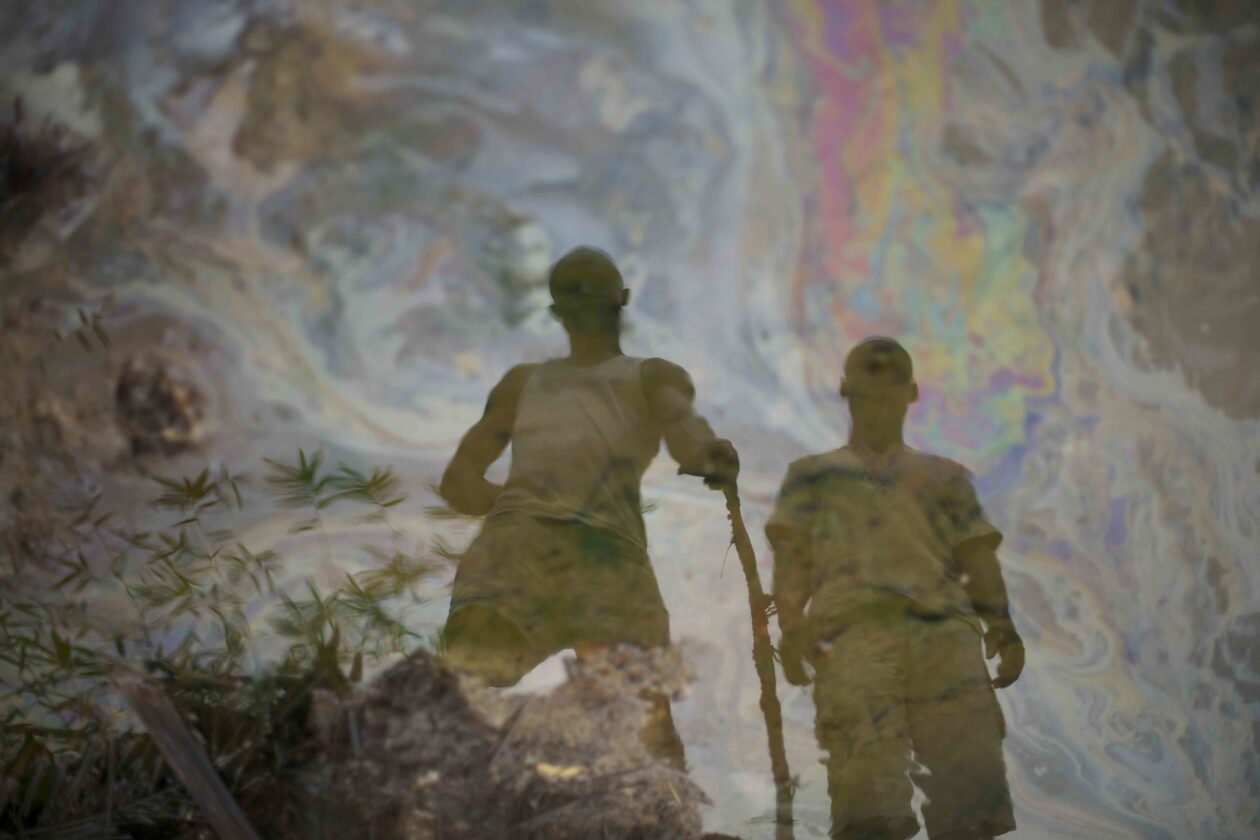
Black Gold and the Resulting Environmental Devastation
Oil was first discovered in 1958 in Ogoniland, a coastal land of about a million people, most of whom are farmers and fisherfolk. Since then, Shell Oil Company has extracted an estimated $30 billion worth of oil from the region, transforming once-fertile farmland into fields contaminated by oil spills and acid rain. Prolific oil exploitation resulted in over 96 wells connected to five oil fields being flared 24 hours a day until 1993, harming nearby communities and the climate.
Sometimes ruptured pipes would cause huge fires that burned for days, spreading into nearby communities and agricultural fields. In 1998, one such incident occurred in Jesse community, Delta state, and killed at least 1,082 people. In 2004, the community of Goi was engulfed in crude oil fires. Many of the residents displaced by the fire still have no place to call home. In 2007 and 2008, two other Ogoni communities, Bue-Leh and Busuu, were largely destroyed when pipelines erupted in flames.
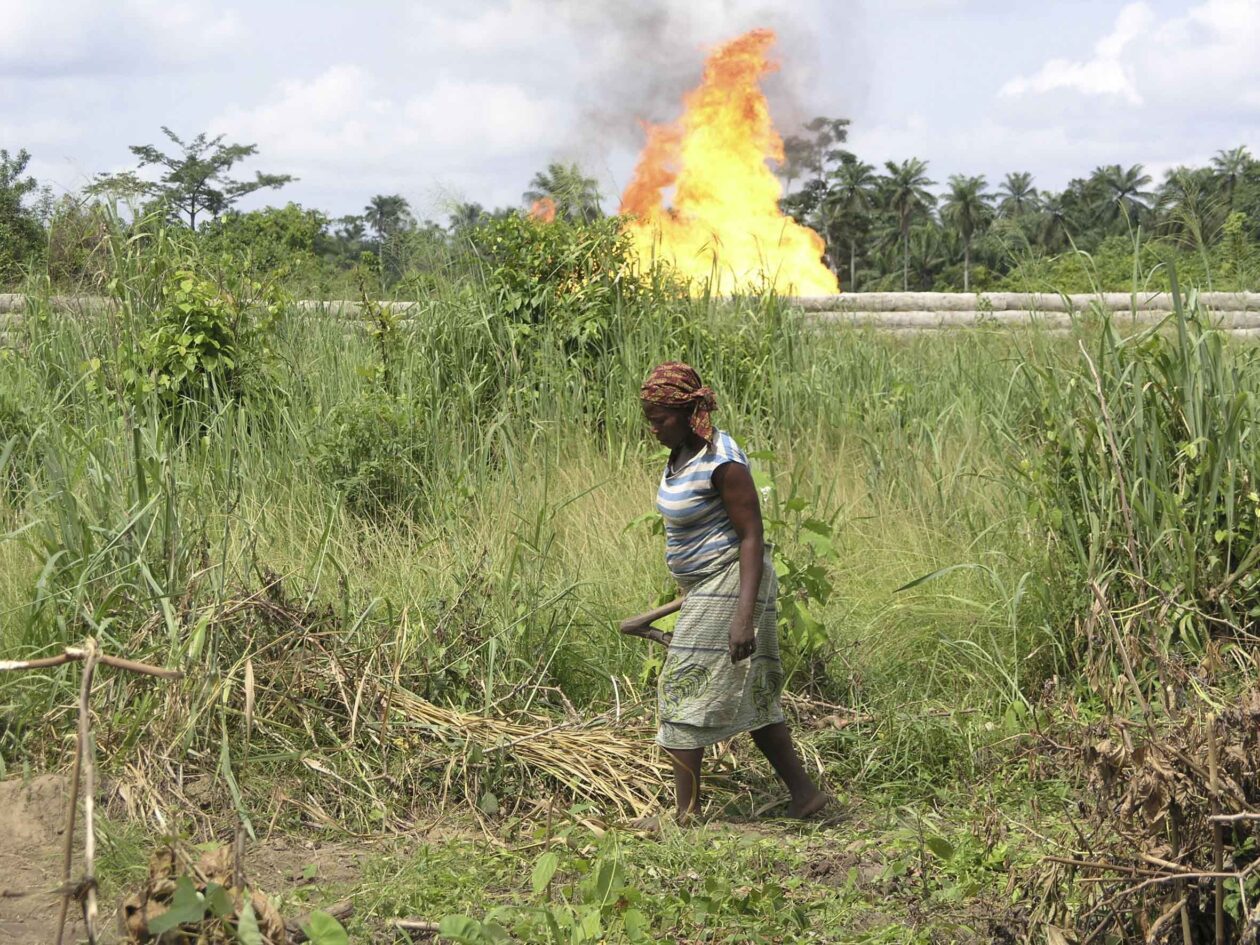
A 2011 United Nations Environmental Programme (UNEP) report stated that all water in Ogoniland was so polluted that emergency action should be taken to provide people with clean drinking water. Optimistic assessments predicted 25 years to clean up the Delta. Yet ten years later, the environmental remediation is not on track, and people in Ogoniland continue to lose their livelihoods and drink the contaminated water. Because of Shell’s actions, the Niger Delta is one of the most polluted places on earth.
Activism and Greengrants in the Niger Delta
Since 2004, Global Greengrants Fund has awarded 126 grants, totaling over $600,000, to community groups, networks, researchers, and activists across the Niger Delta, working to address human rights violations and environmental issues caused by the contamination.
- From 2005 to present, we awarded nine grants to the Ogoni Solidarity Forum, a group that works in alliance with people across the Niger Delta for better rights through education, mobilization, and advocacy. One grant in 2005 helped the Forum document the struggle of the Ogoni people against oil exploitation by creating a literature base and a website. Another grant in 2016 enabled the Forum to hold a candle light vigil in commemoration of the 20th anniversary of the murder of Ken Saro Wiwa, which also doubled as a public event to pressure Shell and the Nigerian government to implement the UNEP Report.
- In 2006, we awarded $3,500 to the Persons with Disabilities Network (PEDANET) to support a survey and publish a document on the experiences of people who became disabled as a result of oil exploitation. Another grant of $3,500 in 2019 supported PEDANET’s project, “Amplifying the Voice of Persons with Disabilities”, to mobilize persons with disabilities to discuss disability rights within the context of disaster management related to gas flaring as well as climatic shocks. The grant also helped the group advocate for sustainable inclusion of persons with disabilities in their communities and ongoing dialogues.
- From 2015 to present, we awarded five grants to Lokiaka Community Development Centre to grow a women’s movement across the Delta to address health and safety impacts of oil spills on women, food sovereignty, and ensure that that local women are included and benefit from the restoration of the land. One $4,000 grant helped the group cultivate a nursery of mangrove seedlings and native fruit trees. Once the oil contamination is cleaned to an appropriate standard, the women will replant the destroyed mangrove forests, revitalizing fish populations and waterways that locals depend on.
- In 2017, Citizens Trust Advocacy and Development Centre used $3,500 to host an intervention to develop the capacity of communities to negotiate corporate social responsibility agreements with oil companies, particularly Shell, in an inclusive manner that protects the interest of local people.
- In 2018, the Goi Committee used $2,000 in support of its ongoing legal action against Shell for oil spills in 2004 and 2008, which polluted the community of Goi so prolifically that it forced people to leave their homes and land. The funds helped with travel, documentation, and meetings.
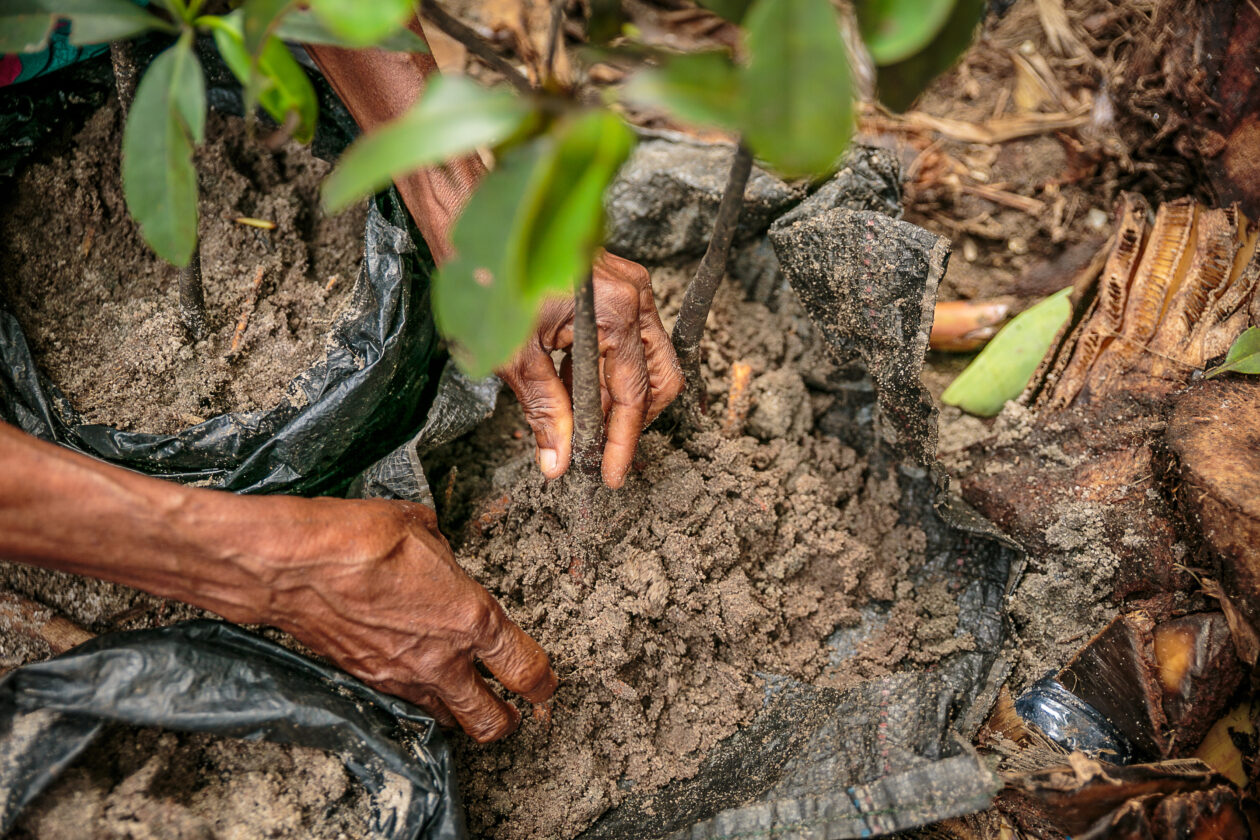
While last month’s victory in the Dutch court was a step in the right direction, it is important to know that it can take years – if ever – for companies to clean up their damages and pay reparations to communities impacted by oil exploitation. This is why it is so critical to support more holistic grassroots solutions, like the ones mentioned above, to restore the land, educate local communities on their rights, and create alternative and sustainable forms of income generation. At Global Greengrants Fund, we know that these ongoing, long-term efforts led by communities on the ground can have the biggest payoff.
Justice is long overdue in the Niger Delta. But this ruling is a step in the right direction, hand in hand with the countless people taking small steps across the Niger Delta in the name of environmental justice.
